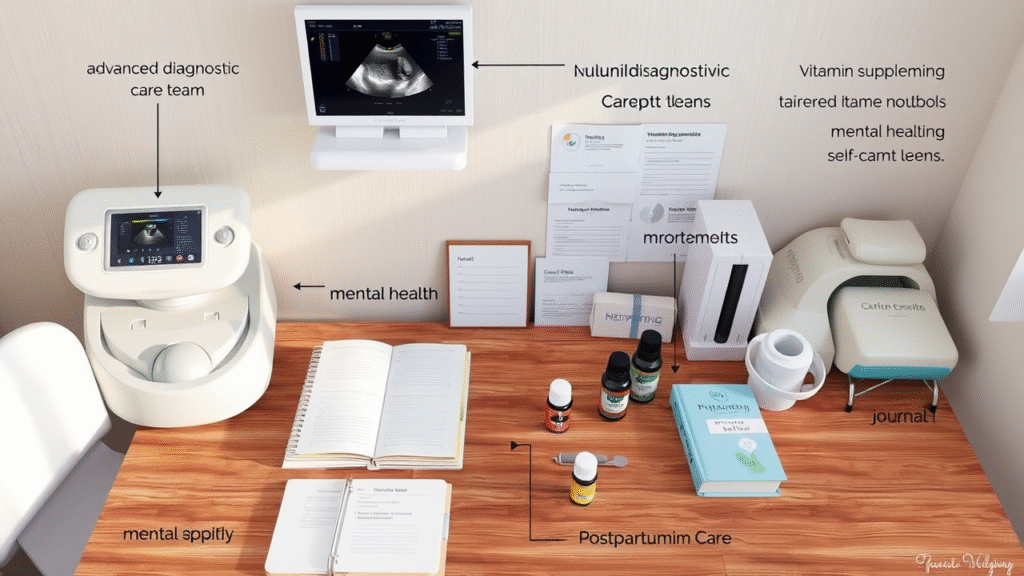As more women choose to become mothers later in life, preparing older mothers for high-risk pregnancies has become essential. These pregnancies require specialized care plans that address unique challenges and promote the best outcomes. This blog explores critical aspects such as understanding age-related risks, creating personalized monitoring strategies, and integrating multidisciplinary teams. It also covers tailored nutrition, mental health support, advanced diagnostics, postpartum care coordination, and empowering education for older expectant mothers. Each section offers focused insights into how comprehensive care can help navigate the complexities of high-risk pregnancies with confidence and compassion.
Understanding the Unique Risks Older Mothers Face During Pregnancy
Understanding the unique risks older mothers face during pregnancy is essential for crafting effective, specialized care plans. Advanced maternal age often brings heightened chances of complications such as gestational diabetes, hypertension, and chromosomal abnormalities. Recognizing these risks early allows healthcare providers to develop personalized monitoring strategies that closely track maternal and fetal health throughout pregnancy. This understanding also underscores the importance of integrating multidisciplinary teams—combining obstetricians, endocrinologists, and mental health specialists—to comprehensively address complex needs. Tailoring nutritional and lifestyle interventions becomes critical in mitigating risk factors specific to older expectant mothers. Additionally, awareness of emotional challenges linked to high-risk pregnancies helps guide mental health support initiatives. Employing advanced diagnostic technologies further enhances early detection of potential issues rooted in age-related vulnerabilities. Ultimately, a deep grasp of these distinctive risks informs coordinated postpartum care and empowers older mothers through education and supportive networks, ensuring better outcomes from pregnancy through long-term health management.
Developing Personalized Monitoring Strategies to Support Older Mothers Throughout Pregnancy

Developing personalized monitoring strategies is crucial to effectively supporting older mothers throughout pregnancy, as it addresses their unique and evolving needs in real time. These tailored plans often integrate insights from multidisciplinary teams, ensuring comprehensive care that spans obstetrics, nutrition, mental health, and diagnostics. By customizing monitoring protocols based on individual risk factors identified through advanced diagnostic technologies, healthcare providers can detect complications early and adjust interventions promptly. This approach also complements targeted nutritional and lifestyle modifications designed specifically for older expectant mothers, enhancing maternal and fetal well-being. Furthermore, personalized monitoring facilitates ongoing assessment of emotional well-being, enabling timely mental health support during this high-risk journey. Coordinating postpartum care further benefits from these individualized strategies by anticipating potential long-term health challenges unique to older mothers. Ultimately, such bespoke surveillance empowers women with knowledge and reassurance, reinforcing the vital role of education and support networks in navigating high-risk pregnancies confidently and safely.
Integrating Multidisciplinary Teams to Enhance Outcomes for Older Expectant Mothers
Integrating multidisciplinary teams is essential to improving outcomes for older expectant mothers facing high-risk pregnancies. This collaborative approach brings together obstetricians, nutritionists, mental health specialists, and diagnostic experts to create comprehensive care plans tailored to the unique risks identified in older mothers. By combining expertise from developing personalized monitoring strategies with tailored nutritional and lifestyle interventions, these teams address both physical and emotional well-being holistically. Coordinated efforts ensure early detection of complications through advanced diagnostics while supporting continuous mental health care throughout pregnancy and postpartum stages. Moreover, multidisciplinary collaboration facilitates seamless communication in managing long-term health after delivery, aligning with the critical need for coordinated postpartum care. Through education and support networks integrated into this team framework, older mothers are empowered with knowledge and reassurance. Ultimately, this unified model transforms specialized care plans into dynamic, responsive systems that effectively meet the complex needs of older women during high-risk pregnancies.
Tailoring Nutritional and Lifestyle Interventions to Meet the Needs of Older Pregnant Women

Tailoring nutritional and lifestyle interventions is crucial to effectively support older pregnant women navigating high-risk pregnancies. This approach recognizes that metabolic changes, preexisting conditions, and age-related nutritional needs differ markedly in this group. Customized plans focus on optimizing nutrient intake, managing weight gain, and promoting safe physical activity to enhance maternal and fetal health. These individualized strategies complement personalized monitoring techniques by reducing risk factors early and aligning with multidisciplinary care teams’ goals for comprehensive management. Addressing mental health through diet and lifestyle also ties into emotional well-being efforts, ensuring holistic support. Early detection technologies can guide timely adjustments to nutrition or activity levels, preventing complications common in advanced maternal age. Finally, a tailored intervention plan lays the foundation for seamless postpartum care and empowers older mothers with practical knowledge within support networks—strengthening their resilience throughout the entire high-risk pregnancy journey described in this blog.
Addressing Mental Health and Emotional Well-being in Older Mothers Facing High-Risk Pregnancies
Addressing mental health and emotional well-being is a critical component of specialized care plans for older mothers facing high-risk pregnancies. These women often encounter heightened anxiety, stress, and uncertainty due to the unique risks associated with advanced maternal age, as discussed in the section on understanding these risks. Integrating psychological support within multidisciplinary teams ensures that emotional challenges are identified early and managed alongside physical health concerns. Personalized monitoring strategies can also include regular mental health assessments, helping to detect signs of depression or prenatal anxiety that may impact both mother and baby. Tailoring interventions goes beyond nutrition and lifestyle—it must encompass coping techniques and counseling tailored to this demographic’s specific stressors. Additionally, empowering older mothers through education and support networks fosters resilience by connecting them with others experiencing similar journeys. Finally, coordinating postpartum care involves continued emotional support to address potential mood disorders or adjustment difficulties after delivery, ensuring comprehensive well-being throughout the entire pregnancy continuum.
Implementing Advanced Diagnostic Technologies to Detect Complications Early in Older Mothers

Implementing advanced diagnostic technologies is crucial in detecting complications early for older mothers, who face unique pregnancy risks. Cutting-edge tools such as high-resolution ultrasounds, non-invasive prenatal testing, and continuous fetal monitoring allow clinicians to identify issues like gestational diabetes, preeclampsia, or chromosomal abnormalities promptly. Early detection through these methods supports the development of personalized monitoring strategies tailored to each mother’s health profile, linking closely with multidisciplinary care teams who interpret data for timely interventions. Integrating these diagnostics enhances not only physical outcomes but also informs targeted nutritional and lifestyle plans that mitigate risk factors. Additionally, having precise information early on can ease mental health concerns by providing reassurance and guiding emotional support frameworks. This proactive approach ultimately strengthens postpartum care coordination and empowers older mothers with knowledge, aligning with broader goals of specialized care plans designed to optimize both maternal and fetal well-being throughout high-risk pregnancies.
Coordinating Postpartum Care and Long-Term Health Management for Older Mothers After High-Risk Pregnancies
Coordinating postpartum care and long-term health management is a critical extension of specialized care plans for older mothers after high-risk pregnancies. This phase focuses on addressing the lasting impacts of pregnancy-related complications while supporting recovery and promoting overall well-being. Effective coordination ensures seamless communication among multidisciplinary teams, linking closely with strategies outlined in integrating expert providers during pregnancy. It also involves ongoing monitoring to identify chronic conditions that may arise, reflecting the personalized approach emphasized in developing monitoring strategies. Nutritional guidance and lifestyle modifications continue to play a vital role after delivery, reinforcing tailored interventions designed earlier in pregnancy. Mental health support remains essential as older mothers navigate emotional challenges postpartum, complementing efforts highlighted in addressing psychological well-being. By prioritizing comprehensive follow-up care, healthcare providers empower older mothers not only to recover fully but also to maintain long-term health, closing the loop on holistic support from preconception through postnatal life stages.
Empowering Older Mothers Through Education and Support Networks in High-Risk Pregnancy Care
By fostering education and strong support networks, older mothers gain the confidence and resources needed to navigate the complexities of high-risk pregnancies. This empowerment complements personalized care plans, multidisciplinary collaboration, and tailored interventions discussed throughout this guide. When women are informed and supported emotionally and practically, their well-being—and that of their babies—can significantly improve. In this journey toward safer pregnancies and healthier outcomes, MomDadDispatch.com stands as a compassionate companion dedicated to sharing knowledge and encouragement every step of the way.






